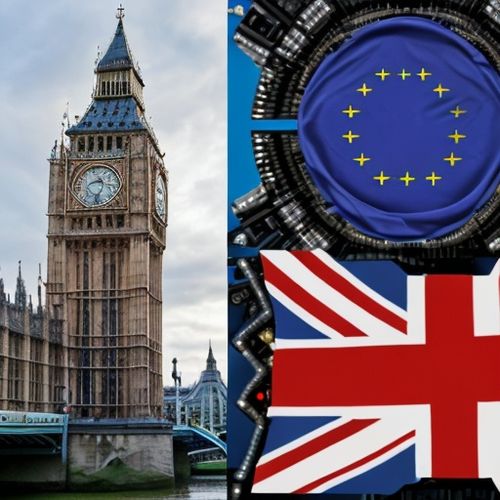The UK's approach to artificial intelligence regulation has become a focal point for global tech companies, particularly those based in the United States. With its so-called "light-touch" policy, the British government is positioning itself as a welcoming hub for AI innovation, offering a less restrictive environment compared to the European Union or even the US itself. This strategy is already yielding results, with several American tech giants considering or confirming London as their European headquarters for AI development and operations.
The appeal of Britain’s regulatory framework lies in its flexibility. Unlike the EU’s AI Act, which imposes stringent rules on high-risk applications, the UK has opted for a sector-specific approach that avoids blanket restrictions. This allows companies to operate with greater freedom while still adhering to ethical guidelines. For US firms accustomed to a more laissez-faire environment at home, the UK’s stance feels familiar—yet with enough structure to ensure public trust in emerging technologies.
Industry leaders have taken notice. Over the past year, multiple Silicon Valley players have expanded their UK presence, citing the country’s balanced approach as a key factor. "The UK understands that overregulation stifles innovation," said one executive from a prominent AI startup that recently relocated its international HQ to London. "Here, we can experiment with cutting-edge applications without drowning in compliance paperwork."
This regulatory philosophy extends beyond just legislation. The British government has actively fostered partnerships between tech firms and academic institutions, creating a pipeline for talent and research collaboration. Cambridge, Oxford, and Imperial College London have become hotspots for joint ventures between American companies and UK researchers. Such synergies are proving irresistible to firms looking to stay ahead in the competitive AI landscape.
Critics argue that the light-touch approach might lead to ethical corners being cut, especially in sensitive areas like facial recognition or algorithmic bias. However, UK officials counter that their framework includes robust safeguards—just without unnecessary bureaucratic hurdles. "We’re not about rubber-stamping every innovation," clarified a senior policymaker involved in drafting the guidelines. "We’re about enabling responsible progress through dialogue rather than dictate."
The economic implications are substantial. London’s tech sector has seen unprecedented growth in venture capital funding since the AI policy was unveiled. American investors in particular are channeling money into UK-based AI initiatives at record levels. This influx is transforming neighborhoods like King’s Cross and Shoreditch into miniature Silicon Valleys, complete with startup incubators and innovation labs bearing familiar US tech logos.
Brexit unexpectedly plays into this dynamic. Freed from EU regulatory constraints, the UK can craft policies specifically tailored to attract global businesses. While the divorce from Europe initially caused uncertainty, the AI sector has emerged as an unexpected beneficiary. "We’re seeing companies choose London over Dublin or Amsterdam specifically because of our post-Brexit regulatory autonomy," noted a tech industry analyst tracking headquarters relocation trends.
The transatlantic nature of this development is creating new patterns of collaboration. British AI firms are finding easier access to US markets through their American counterparts setting up shop locally. Conversely, US companies gain a foothold in both the UK and European markets through London’s still-strong connectivity despite Brexit. This symbiotic relationship is fostering a unique AI ecosystem that blends American scale with British academic rigor and regulatory pragmatism.
Workforce development forms another pillar of the strategy. The UK has streamlined visa processes for AI specialists while American companies are investing heavily in local training programs. The result is a rapidly growing pool of talent that serves both domestic and international needs. Universities report surging enrollment in AI-related programs, with many courses developed in direct consultation with industry leaders now headquartered in the UK.
The long-term implications could redefine Europe’s tech hierarchy. While Germany and France maintain strong positions in traditional industries, the UK is emerging as the clear leader in artificial intelligence applications. This specialization gives Britain an edge in the post-Brexit economy and positions London as perhaps the most important city for AI development outside of North America and China.
As the global race for AI dominance intensifies, the UK’s light-touch regulatory approach appears to be striking the right balance between innovation and accountability. For American companies weighing where to plant their international flags, Britain’s combination of access to talent, favorable policies, and geographic positioning is proving increasingly difficult to resist. The coming years will reveal whether this strategy maintains its appeal as AI technologies mature and societal impacts become more pronounced.

By Ryan Martin/Apr 7, 2025

By Ryan Martin/Apr 7, 2025

By David Anderson/Apr 7, 2025

By Olivia Reed/Apr 6, 2025

By Daniel Scott/Apr 6, 2025

By Victoria Gonzalez/Apr 6, 2025

By John Smith/Apr 6, 2025

By Elizabeth Taylor/Apr 6, 2025

By James Moore/Apr 6, 2025

By Megan Clark/Apr 6, 2025

By Daniel Scott/Apr 6, 2025

By William Miller/Apr 6, 2025

By Samuel Cooper/Apr 6, 2025

By Amanda Phillips/Apr 6, 2025

By Natalie Campbell/Apr 6, 2025

By Noah Bell/Apr 6, 2025

By Elizabeth Taylor/Apr 6, 2025